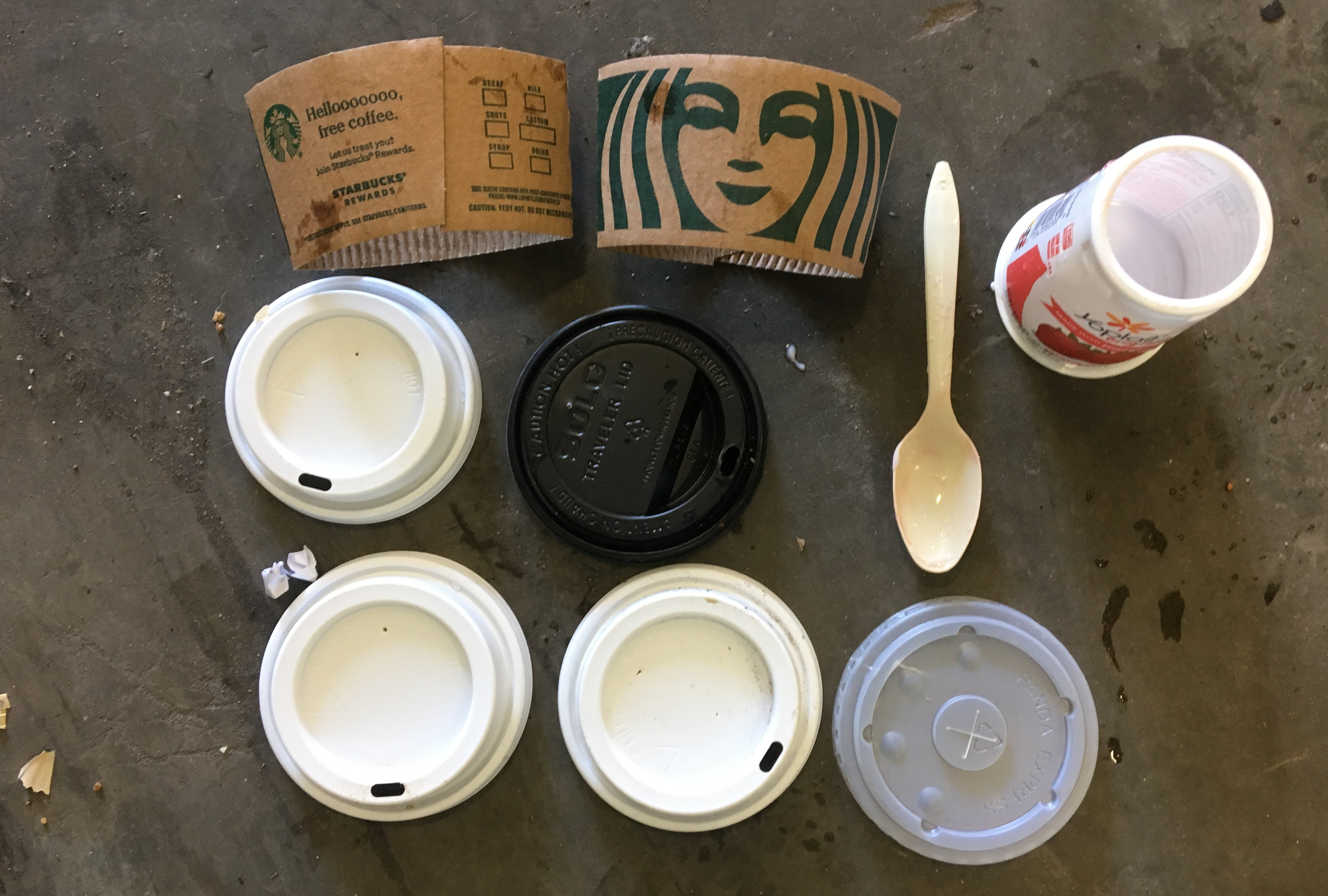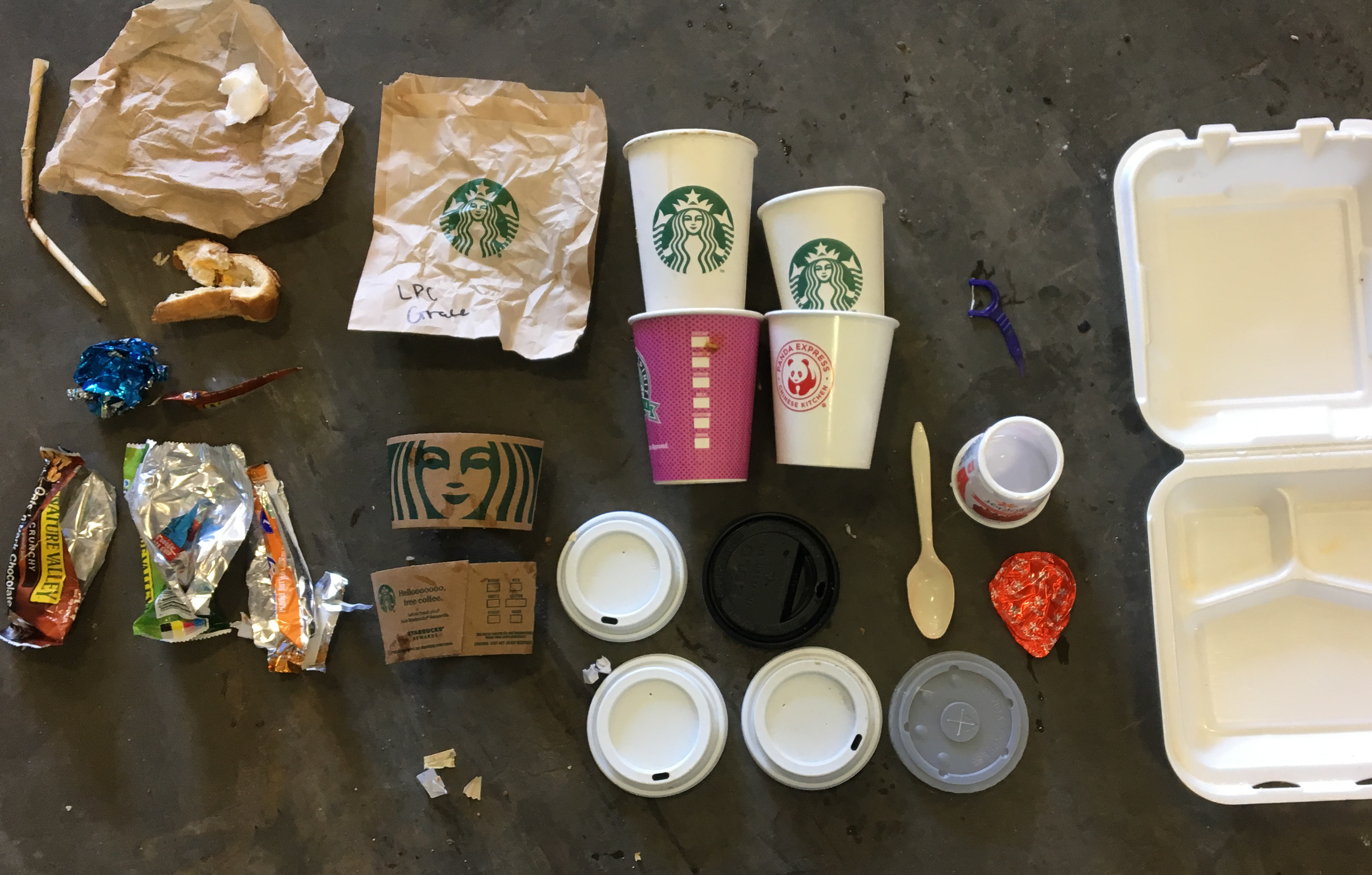What's in the Trash? Wells Hall
Posted by Lea Dyga on May 29th 2019
This week we’re looking into what's being tossed in Wells Hall. This bin, placed directly next to a recycling station, still contained some recyclable commodities. Let's talk through what could've been placed in the recycling bin, and why some of the other items can't be recycled.
Those plastic drink lids and coffee sleeves can easily be recycled as mixed plastic and mixed paper, respectively. Once given a rinse, yogurt cups and plastic spoons can also be placed in the mixed plastics bin.

The true trash included in this bin were the snack wrappers and the yogurt lid. These items are mixed materials, which disqualifies them from recycling through MSU as their components cannot be separated for processing. The granola bar wrappers are made of layers of polypropylene and polyethylene, which are both a type of plastic, and a thin coating of aluminum. These materials work together to preserve the quality of the food and resist unintentional rips and tears. This type of packaging is also commonly used for chips, cookies, Pop-Tarts, fruit snacks, and other on-the-go snacks. The ‘metallized’ plastic film so commonly used for chip bags takes an extremely long time to decompose, with sources estimating that they take around 80 years before they start to show any signs of rotting. Earlier this year, a Doritos bag from the 1970s washed ashore, showing little sign of weathering. Right now, the best way to combat this issue is to avoid purchasing these kinds of products. It might seem challenging to skip on that bag of Lay’s but solving this debris dilemma will prove to be more rewarding. Consider buying snack foods from the bulk section of the grocery store and keep them in a reusable container.
The yogurt lid is mostly made from aluminum foil, but a thin coating of polypropylene plastic means it can’t be recycled. You can check to see if your yogurt lid is recyclable by preforming a ‘tear test.’ If you rip the lid and see a thin clear film being stretched and torn as well, it cannot be recycled. If the tear is clean, it can be recycled. Since these items can’t be recycled, we recommended looking at a different ‘R’ – Reduce. Consider buying your snacks in larger quantities – such as a 32-ounce yogurt container -- then portioning the food into single-serving reusable containers to take with you. While this still generates waste, you’re ultimately tossing less packaging.
One tricky item discovered during our waste audit is the polystyrene (Styrofoam) take out box. Polystyrene is used for many items like packing peanuts and beverage cups. It makes up about 30% of landfills by volume, mostly due to its excessive use in packaging, but it's virtually non-biodegradable. Foam cups and other polystyrene materials will break apart in some settings, taking about 50 years to dissolve in the ocean, but are estimated to take upwards of a million years to degrade in a landfill.
SSRC does not collect Styrofoam in all campus buildings or at our drop off center. However, if you are an MSU student, staff/faculty, alumni, or retiree, you can utilize our MSU Community Reuse program – drop off your Styrofoam to the Surplus Store during open hours and we will recycle it though Dart in Mason. Also, if you work on campus and deal with a lot of Styrofoam, consider becoming a Waste Warrior to get Styrofoam recycling (and additional services) in your office or building.
Lastly, let’s take a look at the floss pick. The floss itself is made with nylon filaments or plastic monofilaments and the plastic picks are usually made of polypropylene (#5). This means the pick (and conventional floss cartridges) can be recycled with mixed plastics but the floss itself cannot. Some alternatives to traditional floss include using compostable silk floss (check out Dental Lace for a zero-waste option), using a water pick, or investing in a reusable floss handle if you desire the aid of a flossing tool. To ensure your dental hygiene products are bring properly disposed of, check out the Colgate Oral Care Recycling Program, which will take back not only floss cartridges, but toothpaste tubes and caps, toothbrushes, toothpaste cartons, and toothbrush outer packaging.
Have specific questions about what should go in the trash or what can be recycled? Message us on Facebook, Instagram or Twitter. Happy recycling!

